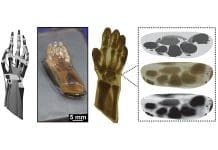The UK government has launched a new funding worth over £14 million to drive forward real-world applications of quantum technology
The investment aims to support key sectors, including healthcare, transport, defence, and infrastructure, while improving the UK’s position as a global leader in quantum technology innovation.
Transforming healthcare and public services
Some of the most promising projects are new quantum-enabled medical scanners that could revolutionise healthcare delivery.
Companies like Siloton and Cerca Magnetics are developing compact, affordable diagnostic tools, such as portable quantum eye scanners and next-generation brain imaging systems, to help diagnose conditions like epilepsy more accurately and efficiently. These advances could significantly reduce NHS backlogs and make high-quality diagnostics more accessible across hospitals and clinics.
Quantum sensing technologies are also being utilised to accelerate cancer testing. Research by the National Physical Laboratory aims to create ultra-sensitive sensors that enhance mass spectrometry, enabling quicker and more precise analysis of blood samples for early disease detection.
More intelligent, more resilient infrastructure
Quantum technology is playing a crucial role in enhancing the reliability and safety of national infrastructure. Delta G Limited’s “Gravity Cartography Mission” is developing a quantum gravity sensor capable of detecting underground tunnels and hidden structures without the need for excavation. This breakthrough could save civil engineers time and money while reducing disruption to construction projects.
In transportation, Monirail Ltd is advancing a quantum navigation system for trains, designed to improve the accuracy and reliability of transport networks, such as the London Underground.
Other innovations include quantum clocks and timing systems being developed by Nascent Semiconductor and AQuark Technologies, which will provide more secure and resilient timing signals for telecommunications and financial services.
Boosting national security and international collaboration
Quantum’s potential for defence and security is being further strengthened through the creation of the Quantum Centre for Nuclear Defence and Security (QCNDS). Led by the University of Strathclyde in partnership with AWE and other leading UK universities, the centre will focus on applying quantum computing and sensing to critical areas of nuclear science and technology. These advances will help safeguard the UK’s national security and enhance its technological edge.
The UK is also expanding its global quantum technology partnerships. New collaborations include a Memorandum of Understanding with Japan to create joint research and talent exchange in quantum computing, as well as a revitalised Scotland-California partnership connecting leading UK universities with Stanford and Caltech.
A joint UK-Canada quantum communications initiative, as well as the forthcoming UK-Singapore quantum satellite mission, SpeQtre, further demonstrated the UK’s international leadership in quantum research.
Building the foundation for the future
These initiatives form part of the government’s efforts to unlock quantum’s full economic and social potential. Quantum technologies could contribute up to £11 billion to the UK economy and create over 100,000 jobs by 2045.
The funding announced through Innovate UK’s Quantum Sensing Mission Primer awards will accelerate the commercialisation of quantum innovations.
As 2025 marks the International Year of Quantum, the UK’s investment demonstrates its commitment to transforming cutting-edge research into tangible benefits, driving economic growth, enhancing public services, and securing the nation’s future through world-leading science and technology.











